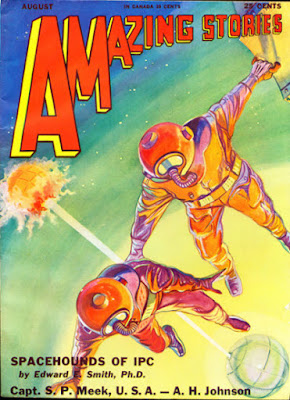 |
| Photo Credit: Wikimedia Commons/Radio-Science Publications |
I just started reading Larry Niven’s novel from the ‘70s, Protector, and so far it’s been really
grabbing and thought-provoking. I’ve been reading a lot more novels for about
the past two years even though I’m more a short story person both as reader and
writer. Over all, short fiction isn’t as well-received as it was in the earlier
half of the 20th century. It may be better received in the sci fi
and fantasy genres than it is in other genres such as mainstream. But even
among speculative fiction for the last decade or so, the short story has been
dwarfed in popularity by larger works. Until now. The literary market is
beginning to lean towards shorter works again.
The Short Story Returned
For the past year, media and literary organizations have
been reporting on the return of the short story. Sources everywhere from the
New York Public Library to Writers Digest
have been indicating this. What has made the short story so popular again?
Author Anne R. Allen says in an article at WritersDigest.com that it’s due to e-readers
and other handheld devices people can download stories to, including smart
phones. This is especially the case with anthologies. But short fiction’s return isn’t
only limited to electronic format. It is becoming popular in print as well,
especially in anthologies. An article in The Independent says that the short story is making a comeback from both established authors as well as ones early in their careers.
This boom, or re-boom,
includes science fiction and fantasy authors. According to The Independent, Margaret Atwood has a collection out that has been
critically acclaimed in the last couple years. Only this weekend, io9 said “we’re
living in a new ‘golden age’ of short science fiction.” It’s as if the sci fi pulp era has
returned reincarnated, only the stories are of even higher quality overall. io9 also said in an article from last
month that MIT has been putting out its own annual anthology of short science
fiction since 2011, science fiction inspired by today’s cutting edge technology.
Contributing authors to this anthology have been notable ones such as Bruce
Sterling, William Gibson, Charles Stross and Annalee Newitz.
Shorter Books Trending
I took a webinar on self-publishing not too long ago where
the presenter said that shorter books are beginning to sell more and so are in
higher demand than they were a few years ago. Before that I was concerned
whether I’d have enough stories ready for my upcoming collection, The Hidden, to make it worth the while
publishing but because of this trend in the book market maybe I’ll have enough
after all. If that’s the case, I may be able to release it by mid November. We’ll
see.
Do you prefer reading short fiction or longer fiction? Feel
free to leave your answers in the box below.
Until next time . . .
Comments
Post a Comment